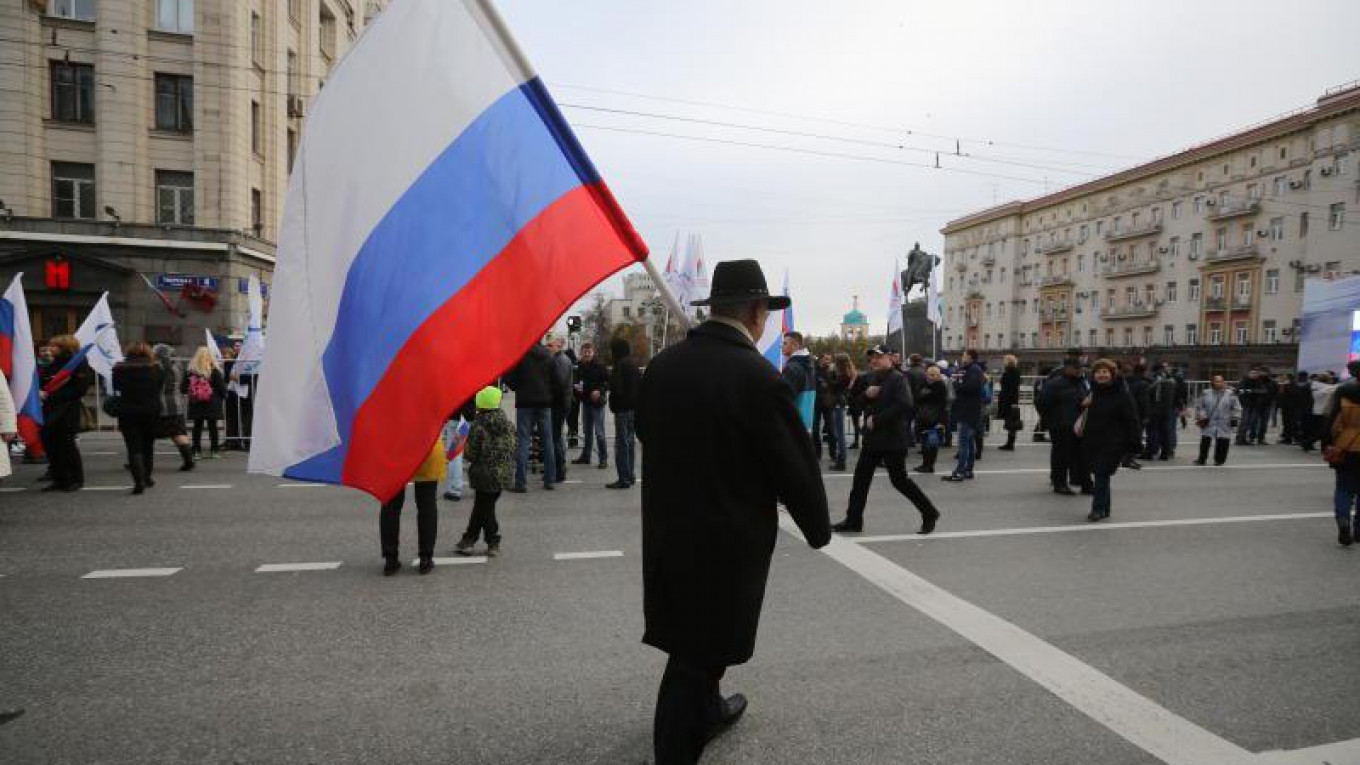Единство: unity
Almost 100 years ago on October 25 there was a coup d’etat in Russia that went down in history as Великая Октябрьская Революция (Great October Revolution), or Великий Октябрь (Great October) for short. With something as world-shaking as a revolution, you’ve got to have a holiday to celebrate it. But by the time the Soviet state got around to that, they’d already switched from the Julian to the Gregorian calendar and jumped ahead 13 days. So from 1918 to 1991 they celebrated День Великой Октябрьской социалистической революции (Day of the Great October Socialist Revolution) on November 7, apparently untroubled by the incongruity.
Or maybe celebrating October in November was practice for the Soviet policy, later perfected, of calling black white. In any case, at some point people stopped believing that black was white and that Great October was in November, and the Soviet Union collapsed.
The new government condemned the revolution and would not celebrate it, but they knew that their beleaguered people needed a few days off in November. So they kept November 7 as a holiday, but in 1996 renamed it День согласия и примирения (Day of Accord and Reconciliation). Unfortunately, there was neither accord nor any desire to reconcile, so the country was back to calling black white.
In 2004 the government decided to scrap November 7 altogether, but they still wanted a November holiday. (Habits die hard.) After much flipping through history books and clicking on calculators, they decided that October 22 in the 17th century — aka November 4 today — would be a fine holiday. On that day, they said, a rebel army led by the peasant Kuzma Minin and the prince Dmitry Pozharsky attacked the “польские интервенты” (Polish invaders) and kicked them out of the Kremlin. Or close enough. This, they said, demonstrated образец героизма и сплочённости всего народа вне зависимости от происхождения, вероисповедания и положения в обществе (an ideal of heroism and unity of the entire nation regardless of origins, religious belief or place in society). Or close enough.
Although the holiday is called День народного единство (Day of National Unity), for the first several years it was celebrated with something called Русский Марш (Russian March) with people holding signs proclaiming Россия для русских (Russia for Russians), which seemed to be in rather violent opposition to the central idea of the holiday. And we were back to calling black white again.
This year the day will be marked by the unveiling of a large monument to Prince Vladimir, clearly because he had just the sort of multi-national, multi-confessional background that epitomizes терпимость (tolerance) and сплочение (unification). He was the illegitimate son of a Kievan Prince of Scandinavian origin who, with the help of an army from modern-day Norway, conquered the Slavic lands to become the leader of Kievan Rus in present-day Ukraine. Once a practicing pagan with a slew of concubines, he accepted Christianity in 988.
Meanwhile, in St. Petersburg the holiday is being celebrated with posters: Мы едины для мира — a strange, almost ungrammatical statement that is most likely a translation from the English: We’re united for peace. Close enough.
If the year 2016 has taught us anything, it’s that a lot of people all over the world love calling black white. So a Christian saint on a secular holiday is no problem, and a bad Russian translation of an English slogan fits the bill.
С праздником! (Happy holiday!)
Michele A. Berdy is a Moscow-based translator and interpreter, author of “The Russian Word’s Worth,” a collection of her columns.
A Message from The Moscow Times:
Dear readers,
We are facing unprecedented challenges. Russia's Prosecutor General's Office has designated The Moscow Times as an "undesirable" organization, criminalizing our work and putting our staff at risk of prosecution. This follows our earlier unjust labeling as a "foreign agent."
These actions are direct attempts to silence independent journalism in Russia. The authorities claim our work "discredits the decisions of the Russian leadership." We see things differently: we strive to provide accurate, unbiased reporting on Russia.
We, the journalists of The Moscow Times, refuse to be silenced. But to continue our work, we need your help.
Your support, no matter how small, makes a world of difference. If you can, please support us monthly starting from just $2. It's quick to set up, and every contribution makes a significant impact.
By supporting The Moscow Times, you're defending open, independent journalism in the face of repression. Thank you for standing with us.
Remind me later.








